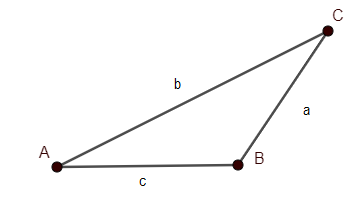Question
Question: In any \(\Delta ABC\) , prove that \(\left( {{b}^{2}}-{{c}^{2}} \right)\cot A+\left( {{c}^{2}}-{{a...
In any ΔABC , prove that
(b2−c2)cotA+(c2−a2)cotB+(a2−b2)cotC=0
Solution
Hint: Try to simplify the left-hand side of the equation given in the question. Start by writing cotA, cotB and cotC in terms of sine and cosine followed by the application of the cosine rule of a triangle.
Complete step-by-step answer:
Before starting with the solution, let us draw a diagram for better visualisation.

Now starting with the left-hand side of the equation that is given in the question. To start the simplification, we need to use the formula cotX=sinXcosX .
(b2−c2)cotA+(c2−a2)cotB+(a2−b2)cotC
=(b2−c2)sinAcosA+(c2−a2)sinBcosB+(a2−b2)sinCcosC
Now we know, according to the sine rule of the triangle: sinAa=sinBb=sinCc=k and in other terms, it can be written as:
ka=sinAkb=sinBkc=sinC
So, applying this to our expression, we get
k(b2−c2)acosA+k(c2−a2)bcosB+k(a2−b2)ccosC
Now according to the cosine rule of a triangle:
cosA=2bcb2+c2−a2cosB=2aca2+c2−b2cosC=2abb2+a2−c2
So, applying this to our expression, we get
k(b2−c2)(2abcb2+c2−a2)+k(c2−a2)(2abca2+c2−b2)+k(a2−b2)(2abcb2+a2−c2)
Now we will take k common from all the terms. On doing so, we get
=k((b2−c2)(2abcb2+c2−a2)+(c2−a2)(2abca2+c2−b2)+(a2−b2)(2abcb2+a2−c2))
To further simplify the expression, we will multiply and open all the brackets. This will give us:
=2abck(b4−c4−a2b2+a2c2+c4−a4−c2b2+a2b2+a4−b4−c2a2+c2b2)
In the above expression we can clearly see that each term is getting cancelled out, giving the final expression to be:
=2abck×0
Now from the conditions of sine rule, we know that k is not equal to infinity, so we can say that 2abck is finite. We also know that a finite number multiplied by zero gives the product as zero. Therefore, our expression is:
=2abck×0=0
The left-hand side of the equation given in the question is equal to the right-hand side of the equation which is equal to zero. Hence, we can say that we have proved the equation given in the question.
Note: Be careful about the calculation and the signs while opening the brackets. Also, remember that, infinity multiplied by zero is not always zero; it can be a finite number or infinity as well.
